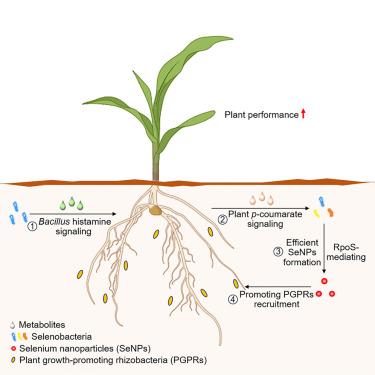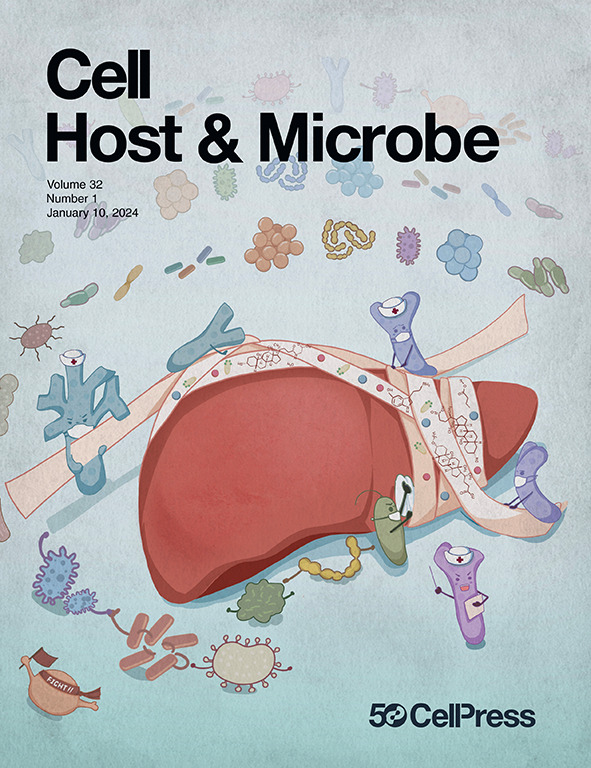Harnessing biosynthesized selenium nanoparticles for recruitment of beneficial soil microbes to plant roots
IF 20.6
1区 医学
Q1 MICROBIOLOGY
引用次数: 0
Abstract
Root exudates can benefit plant growth and health by reshaping the rhizosphere microbiome. Whether nanoparticles biosynthesized by rhizosphere microbes play a similar role in plant microbiome manipulation remains enigmatic. Herein, we collect elemental selenium nanoparticles (SeNPs) from selenobacteria associated with maize roots. In vitro and soil assays show that the SeNPs enhanced plant performance by recruiting plant growth-promoting bacteria (e.g., Bacillus) in a dose-dependent manner. Multiomic profilings unravel a cross-kingdom-signaling cascade that mediates efficient biosynthesis of SeNPs by selenobacteria. Specifically, maize roots perceive histamine signaling from Bacillus spp., which stimulates the plant to produce p-coumarate via root exudation. The rpoS gene in selenobacteria (e.g., Pseudomonas sp. ZY71) responds to p-coumarate signaling and positively regulates the biosynthesis of SeNPs. This study demonstrates a novel mechanism for recruiting host-beneficial soil microbes by microbially synthesized nanoparticles and unlocks promising possibilities for plant microbiome manipulation.

利用生物合成的硒纳米颗粒招募有益的土壤微生物进入植物根系
根渗出物可以通过重塑根圈微生物组来促进植物生长和健康。根圈微生物生物合成的纳米颗粒是否在植物微生物群操纵中发挥类似作用仍是一个谜。在这里,我们从与玉米根系相关的硒细菌中收集元素硒纳米颗粒(SeNPs)。体外和土壤试验表明,SeNPs 能以剂量依赖的方式招募促进植物生长的细菌(如芽孢杆菌),从而提高植物的生长性能。多组学分析揭示了硒细菌高效生物合成 SeNPs 的跨领域信号级联。具体来说,玉米根部能感知来自芽孢杆菌的组胺信号,从而刺激植物通过根部渗出产生对香豆酸盐。硒细菌(如假单胞菌 ZY71)中的 rpoS 基因会响应对香豆酸信号,并积极调节 SeNPs 的生物合成。这项研究展示了微生物合成的纳米颗粒招募对宿主有益的土壤微生物的新机制,并为植物微生物组的操纵提供了广阔的前景。
本文章由计算机程序翻译,如有差异,请以英文原文为准。
求助全文
约1分钟内获得全文
求助全文
来源期刊

Cell host & microbe
生物-微生物学
CiteScore
45.10
自引率
1.70%
发文量
201
审稿时长
4-8 weeks
期刊介绍:
Cell Host & Microbe is a scientific journal that was launched in March 2007. The journal aims to provide a platform for scientists to exchange ideas and concepts related to the study of microbes and their interaction with host organisms at a molecular, cellular, and immune level. It publishes novel findings on a wide range of microorganisms including bacteria, fungi, parasites, and viruses. The journal focuses on the interface between the microbe and its host, whether the host is a vertebrate, invertebrate, or plant, and whether the microbe is pathogenic, non-pathogenic, or commensal. The integrated study of microbes and their interactions with each other, their host, and the cellular environment they inhabit is a unifying theme of the journal. The published work in Cell Host & Microbe is expected to be of exceptional significance within its field and also of interest to researchers in other areas. In addition to primary research articles, the journal features expert analysis, commentary, and reviews on current topics of interest in the field.
 求助内容:
求助内容: 应助结果提醒方式:
应助结果提醒方式:


